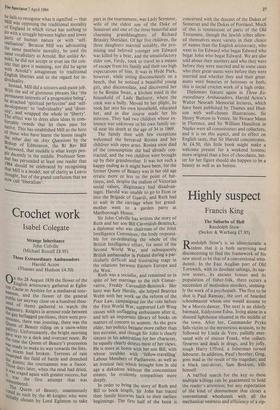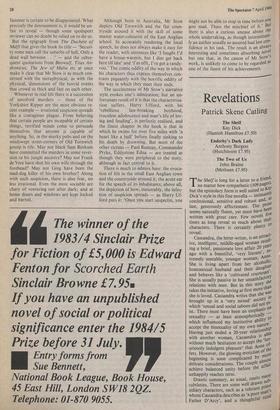Highly suspect
Francis King
The Suburbs of Hell Randolph Stow (Seeker & Warburg £7.95)
Randolph Stow's is so idiosyncratic a talent that it is both surprising and disconcerting to find the framework of his new novel to be that of a conventional who- dunnit. In the East Anglian port of Old Tornwich, with its desolate saltings, its nar- row streets, its ancient houses and its population of fisher-folk, there occurs a succession of motiveless murders, seeming- ly the work of a psychopath. The first to be shot is Paul Ramsay, the sort of bearded schoolmaster whom one would assume to be a Morris-dancer. The next is an elderly barmaid, Eddystone Edna, living alone in a disused lighthouse situated in the middle of the town. After her, Commander Pryke falls victim to the mysterious assassin, to be followed by Linda de Vere, pallidly ener- vated wife of sinister Frank, who collects firearms and deals in drugs, and by jolly, tough Harry Ufford, a fisherman turned labourer. In addition, Paul's brother, Greg, goes mad as the result of the tragedies; and a black taxi-driver, Sam Boskum, kills himself.
A baffled search for the key to these multiple killings can be guaranteed to hold the reader's attention; but any expectation of the kind of denouement that closes a conventional whodunnit with all the mechanical neatness and efficiency of a zip- fastener is certain to be disappointed. What precisely the denouement is, it would be un- fair to reveal — though some spoilsport reviewer can no doubt be relied on to do so. But the epigraph from The Duchess of Malfi that gives the book its title — 'Securi- ty some men call the suburbs of hell, Only a dead wall between . . — and the subse- quent quotations from Beowulf, Titus An- dronicus, The Jew of Malta etc at once make it clear that Mr Stow is as much con- cerned with the metaphysical, as with the physical, dimensions of the horrid events that crowd so thick and fast on each other.
Whenever in real life there is a succession of unsolved murders — those of the Yorkshire Ripper are the most obvious re- cent example — irrational suspicion spreads like a contagious plague. From believing that certain people are incapable of certain things, terrified minds come to persuade themselves that anyone is capable of anything. So, in the murky pubs and on the windswept street-corners of Old Tornwich gossip is rife. May not black Sam Boskum have committed the murders in some rever- sion to his jungle ancestry? May not Frank de Vere have shot his own wife through the forehead? May not Greg have been the mad-dog killer of his own brother? Along with such suspicion, there is also fear, no less irrational. Even the most sociable are chary of venturing out after dark; and at home doors and windows are kept locked and barred. Although born in Australia, Mr Stow depicts Old Tornwich and the flat coun- tryside around it with the skill of some master water-colourist of the East Anglian school. In accurately rendering the local speech, he does not always make it easy for the reader, with sentences like fought I'd have a house-warmin, but I dint get back here till late' and 'I'm offt, I've got a randy- voo.' The comic oddity of the way in which his characters thus express themselves con- trasts piquantly with the horrific oddity of the way in which they meet their ends.
The succinctness of Mr Stow's narrative style evokes one's admiration; but an un- fortunate result of it is that the characterisa- tion suffers. Harry Ufford, with his `rebellious law-breaking boyhood, truculent adolescence and man's life of lov- ing and feuding', is perfectly realised, and the finest chapter in the book is that in which he swims for over five miles with 'a heart like a bull' before finally sinking to his death by drowning. But most of the other victims — Paul Ramsay, Commander Pryke, Eddystone Edna — are treated as though they were peripheral to the story, although in fact central to it.
There is much to admire here: the evoca- tion of life in the small East Anglian town and the countryside around it; the acute ear for the speech of its inhabitants; above all, the depiction of how, inexorably, the infec- tion of suspicion spreads — as Harry Uf- ford puts it: `Once you start suspectin, you
might not be able to stop in time before you goo mad. Thass the mischief of it.' But there is also a curious unease about the whole undertaking, as though intermittent- ly an author usually so assured had lost con- fidence in his task. The result is an always interesting and sometimes absorbing 'love' but one that, in the canon of Mr Stow s work, is unlikely to come to be regarded as one of the finest of his achievements.











































 Previous page
Previous page